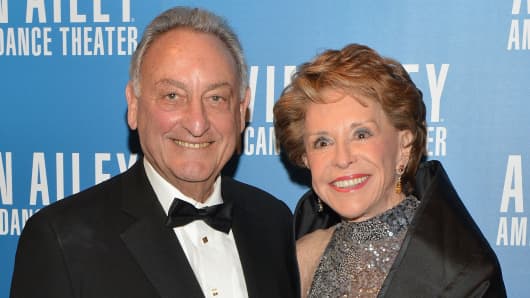We both hail from Brooklyn and when we got married 58 years ago our goal in life was very simple. We wanted to do well enough to be able to afford a deep fryer. This is the honest truth. Sandy worked as a runner on Wall Street making $150 a month, while Joan earned more than Sandy working only two days a week as a teacher.
As a result of compound interest over the years, Joan is adamant that Sandy still owes her money from these early days!
Through much hard work and determination, we were able to buy that deep fryer and, as they say, the rest is history. We have been blessed beyond our wildest imaginations, and we plan to spend the years we have left doing what we have been passionate about for almost four decades now, giving back to a world that has been very good to us.
For us, philanthropy is much more than just writing a check. It's donating your time, energy, experience, and intellect to the causes and organizations you are passionate about. In the early days, we used to say that Joan took care of the streets and Sandy took care of culture. We look at a nonprofit the same way we look at a company—investing in a nonprofit is like buying stock in that organization and we are always looking for the greatest return on our investment.
(Read More: Sandy and Joan Weill make $100 million donation)
(Read More: No bank breakup needed with right regulations: Sandy Weill)
Education and partnership are at the heart of everything we do philanthropically, and we make long term commitments to the organizations we lead: Sandy is the founder and chairman of the National Academy Foundation (since 1982); chairman of Carnegie Hall (since 1991); chairman of Weill Cornell Medical College (since 1995); chairman of the Green Music Center at Sonoma State University (since 2011); and active with the Lang Lang International Music Foundation; Hospital for Special Surgery; University of California, San Francisco Medical Center; Committee Encouraging Corporate Philanthropy; Sidra Medical and Research Center in Qatar; and Rambam Hospital in Israel.
Joan is chair of Alvin Ailey American Dance Theater (since 2000); co-chair of the New York Presbyterian/Weill Cornell Medical Center Women's Health Symposium (since 2000); remains chair emeritus of Paul Smith's College in the Adirondacks; and is active with Citymeals-On-Wheels, Carnegie Hall, National Academy Foundation, Green Music Center at Sonoma State University and the Lang Lang International Music Foundation. Joan really has a passion for making a difference in people's lives one at a time.
Given the various hats we wear with different nonprofit organizations that span the entire United States, we see a new paradigm emerging. It is no secret that federal, state and local budgets are shrinking because of today's challenging economic environment. As a result, the public sector does not have the capital to support education, health care, music and the arts at the level it has been able to do for the last 100 years. The new paradigm we see is the importance of public-private partnerships. The public sector needs the money, and the private sector is going to demand results that will create new, higher standards to benefit everyone. This translates to the need for more philanthropy, and our private sector must answer the call by getting its employees involved and contributing not just financially, but with their time, enthusiasm and experience.
The National Academy Foundation is an example of a public-private partnership model that works. Sandy founded the organization back in 1982 in partnership with the New York City Board of Education, the teachers union and the private sector. The first Academy of Finance opened its doors at John Dewey High School in Brooklyn. Today, the National Academy Foundation has over 500 academies of finance; hospitality and tourism; information technology; engineering; and health sciences that educate more than 60,000 high school students across the country at a very low cost of less than $500 per student. The program has a 97-percent graduation rate with 84 percent of these graduates going on to college, often the first in their family to do so. Employees of more than 2,500 companies volunteer in classrooms, act as mentors, engage National Academy Foundation students in paid internships and serve on local advisory boards.
From our own experiences in philanthropy over the last almost four decades, we have found the following lessons very useful:
- Don't be afraid to make mistakes.
- Don't be afraid to hire people smarter than you.
- The busiest people can always do more.
- You can run a better private business if you help run philanthropic enterprises.
- Whatever you do, be passionate about it.
- Keep it focused, you can't do everything.
- If you don't understand something, don't do it.
- Teams win.
- Be a pragmatic dreamer.
- Maintain a good sense of humor and never take yourself too seriously.
Philanthropy has been a large part of our lives for many years and is something we are deeply passionate about and enjoy doing together. We would encourage you to set goals, and as you come close to achieving those goals, push them out a little further. You will be really amazed at what you can achieve. After all, we began our journey just trying to get our hands on a deep fryer!
—By Sandy and Joan Weill for CNBC.


